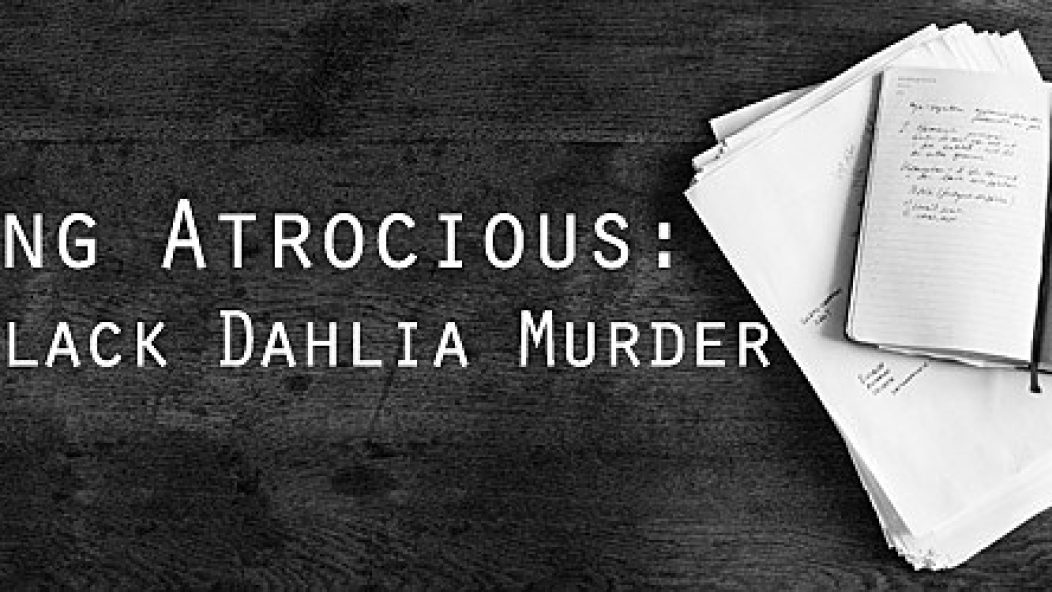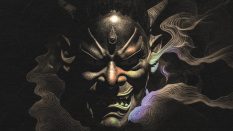
Waxing Atrocious #2 - The Black Dahlia Murder
. . .
Due to their use of bright colors on T-shirts and their stubbly party-guy image, many metalheads choose to lump the Black Dahlia Murder in with the modern deathcore and melodic hardcore bands strewn throughout the scene. This has always perplexed me—the band’s musical output has always been heavily steeped in melodic Swedish death metal like Dismember, At The Gates, and Darkane, and their song subjects have always related to the unholy trinity of metal themes: death, monsters, and the Devil. The latter aspect has always been something I’ve admired in the band, and that many overlook in favor of casting the Black Dahlia Murder in some stupid br00tal light. Not only is the band’s music insane and infectious, but the lyrics of BDM vocalist Trevor Strnad are also undeniably poetic, evocative, and relatable. I fucking love this band, and their lyrics are what turned me from a fan to a devotee.
My appreciation for Strnad’s lyrics wasn’t truly cemented until I read the booklet for 2007’s Nocturnal, so let’s start there. The opening track, “Everything Went Black”, describes a pool of living shadow slowly absorbing reality. On the second verse, Strnad shrieks:
Streetlights bend into the void, cars enveloped whole
Darkness deeper than a blind man’s sleep, soon the paint the world
Insatiable in hunger, it drinks the sea without a belch
Stretching to the other side, where it is sure to meet itself
Hot damn. Strnad’s description of the blackness as “deeper than a blind man’s sleep” displays a Dickensian level of hyperbole, and his illustration of the darkness absorbing the oceans “without a belch: is both oddly human and vastly alien. The final line poses a metaphysical concept that’s beyond cool—that eventually, oblivion reaches oblivion.
On Nocturnal’s title track, which is ostensibly about the universal cabal of the vampire, Strnad continues with his incredible yet indirect descriptions of unholy phenomena:
Parchments scabbed over with plasmatic prose
Prophesize permanent night
The waves of sheer blackness paint ebony my soul
And bestow me with infernal might
The alliterative use of ‘p’ words here is incredible, and literary enough, but it’s also the descriptive language that elevates these lyrics above others—prose being scabbed onto a page like gore paints an incredible depiction of an ancient vampiric tome. More so, the flowery language here suits the song’s characters. Who says “ebony” instead of “black”? Fucking vampires, that’s who.
Something I love about the Black Dahlia Murder is their ability to make horror fresh again. Many of these songs are about the same subject matter as Misfits tunes, but with the injection of the band’s acrobatic hyper-thrash and Strnad’s incredible lyrics, these old-school House of Hammer subjects are brought back to new, urgent, modern life. From “Moonlight Equilibrium” off of 2011’s Ritual, a song about werewolves:
A code embedded deep within
Encrypted in vaults of bone and skin
A tug magnetic toward the dark
The wolf, voracious, hath witnessed its mark
It’s obvious what this song is about, but there’s no bullshit here about a man being pure of heart and saying his prayers at night, or about howling or whatever. There are instead references to the moon’s magnetic effects on the earth, on genetic codes being brought to life. During the refrain, when Strnad says, “We’re all but beasts that hunger from inside”, he brings the werewolf to very human, very real life, relating its condition to our own.
Another solid example of the band’s lyrics rejuvenating old horror stories is in “The Grave Robber’s Work”:
So I’ve clipped a few fingers off to get the gold for which I lust
From the dead man’s bank and trust to the gates of Hell or bust
The blackened bits of exhumed evidenceEmbedded ‘neath my fettered fingernails
It’s but a smallish part of what our dirty work entails
Come dance with meThis graveyard planet that you’ve called Earth
You hold in such a high regard
It’s but as worthless as a turd
Will you follow me into the dark?
Three things make these lyrics awesome. First, there’s the detailed description of the grave robber’s trade—clipping off digits to get rings, for example. Next, there’s the use of language befitting the time of professional grave robbing, phrases like “‘neath” and “but as worthless”. And finally, the last four lines get into the mind of our protagonist, displaying the disgust one feels at seeing upturned noses and lavish finery when he knows deep down that he’ll be prying all of your valuables off of your rotting husk.
A final horror lyric from the Black Dahlia Murder that I’d like to look at is the chorus of “A Shrine To Madness”, a song about Halloween:
Here, in the season of the dead
Sanity hangs by a thread
We’re descendants of the dark
Give us back our one true love
Manifest All Hallow’s Eve
Samhain grim, our one true love
No, you shan’t kill Halloween
For we’ve bore it in our blood
A tradition upheld against the march of normalcy, celebrating shadow and insanity—Halloween has never sounded truer.
Let’s close with a little talk about trueness. Though their lyrical focus often leans more towards the bizarre and macabre than the truly genocidal, the Black Dahlia Murder has always upheld a certain level of blasphemy in their music. Though one might expect them to raise aloft a smoking bong than a blood-filled chalice, the band’s lyrics, masterfully crafted, reveal that not only does the band hail the Dark One, but they do so more eloquently than, say, Beherit.
From “Black Valor” off of 2009’s Deflorate:
Do you show the standard of the six hundred sixty-sixth?
Will your flesh withstand the dawning of apocalypse?
Does your will it guide the spear that pierced the martyr’s ribs?
We will not rest till this rotten planet’s black as pitch
And from “Carbonized In Cruciform,” a song about crucifying nuns and setting them on fire (fuck yeah):
Unearthly ritual
Bloodlet thine human sow
In flames his face appears
Black intentions crystal clearAccept our sacrifice
Their blood will giveth voice
Carbonized in cruciform
Black inversion of the one called Lord
Hail Satan.
Though some dismiss them for silly reasons—the average age of their fanbase, the era in which they became well known, etcetera—the Black Dahlia Murder have proved themselves as a resilient and innovative force in extreme music. Their lyrics remain proof that simple descriptions of gore and Satan, while fun, are rarely as satisfying as well-crafted ones. Other bands should take note, and put in the effort in the hopes of accompanying their crushing sounds with words this damn good.
. . .











